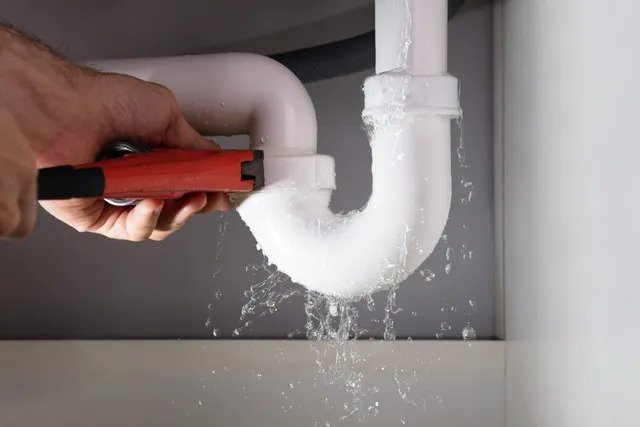Plumbing issues are an inevitable part of homeownership or business management. While some minor problems may seem manageable, others require immediate professional attention to prevent costly damage or prolonged inconvenience. Understanding the warning signs of plumbing trouble can save you time, money, and frustration. We will explore the situations where calling CW Service Pros Plumbing, Heating & Air Conditioning plumber becomes essential, focusing on the key indicators you should always pay attention to. From subtle water leaks to alarming sewage backups, being proactive about plumbing problems is critical to maintaining a safe and functional property.
Persistent Water Leaks
A small, persistent water leak might not seem alarming initially, but it can signal a deeper issue within your plumbing system. Leaks waste water, driving up utility bills, and can lead to structural damage over time. The damp conditions caused by a leak encourage mold and mildew growth, which can compromise indoor air quality and pose health risks. If you notice water dripping from faucets, pooling around pipes, or water stains on walls and ceilings, it's time to call a plumber. They can assess the situation, locate hidden leaks, and fix the root problem. Ignoring leaks can cause further issues, such as corroded pipes or compromised structural elements. Additionally, repairing leaks promptly conserves water and reduces environmental waste, making it a responsible choice for your wallet and the planet. Addressing leaks early is far less expensive than dealing with major water damage later.
Low Water Pressure
Low water pressure is a common plumbing issue that can disrupt daily activities, such as showering, washing dishes, or laundry. It often indicates a deeper problem in the plumbing system, such as pipe corrosion, mineral buildup, or a leak somewhere in the system. Sometimes, it might even signal an issue with the municipal water supply. If low water pressure affects multiple fixtures in your home, it’s likely a systemic problem that requires professional attention. A plumber can inspect the system, clean or replace pipes as needed, and restore water pressure to normal levels. Left unchecked, low water pressure can worsen over time, leading to higher water bills and greater inconvenience. Moreover, it may point to pipe damage that could eventually result in leaks or bursts, causing even more significant repairs. Timely intervention ensures your plumbing system continues functioning efficiently.
Slow or Clogged Drains
A slow or clogged drain is a nuisance that many people attempt to fix with DIY solutions like chemical drain cleaners. However, these products can damage pipes over time and may not address the underlying cause of the clog. Frequent drain clogs often signal a more serious issue, such as tree root intrusion, pipe collapse, or buildup of grease and debris in the sewer line. If multiple drains in your home are slow or completely clogged, it could indicate a blockage in the main sewer line. A plumber has the tools and expertise to diagnose and resolve the problem using hydro-jetting or pipe repair methods. Ignoring clogged drains can lead to unsanitary conditions, water damage, and potential health risks, as wastewater can back into your home. Addressing drain problems promptly ensures your plumbing system remains hygienic and fully operational.
Running Toilets
A running toilet is a deceptively simple problem that can result in significant water waste over time. The constant flow of water occurs when the internal components of the toilet, such as the flapper or fill valve, malfunction. While this might seem like an easy fix, the problem can sometimes be more complex, especially if the issue lies deeper within the plumbing system. If you’ve tried basic adjustments and the toilet continues to run, it’s time to call a plumber. They can identify the cause, repair or replace faulty components, and ensure the toilet operates efficiently. A running toilet increases water bills and adds unnecessary strain on your plumbing system. In some cases, it could indicate a more widespread issue, such as problems with water pressure or an aging plumbing network. Addressing the problem promptly saves resources and prevents further complications.
Unusual Noises in Pipes
Hearing strange noises like banging, gurgling, or whistling from your pipes can be unsettling and is often a sign of underlying plumbing issues. Banging noises, for instance, might indicate a water hammer—a condition caused by a sudden stop or change in water flow. Gurgling sounds often indicate a blockage or venting issue in your plumbing system, while whistling noises suggest high water pressure or loose components. These noises are not just a nuisance; they can lead to pipe damage, leaks, or inefficient water flow if left unaddressed. A plumber can diagnose the problem and make necessary adjustments to ensure your plumbing operates quietly and effectively. Ignoring unusual pipe noises risks compounding the issue, potentially leading to costly repairs or pipe replacement. Early intervention ensures the longevity and reliability of your plumbing system while maintaining peace of mind.
Recognizing the signs of plumbing problems and acting promptly can prevent small issues from becoming major headaches. Knowing when to call a plumber is essential for maintaining your property, whether it’s a persistent leak, low water pressure, clogged drains, or more severe issues like burst pipes or sewage backups. We have explored the most common warning signs you should never ignore, emphasizing the importance of timely action to protect your home and health. Addressing plumbing concerns early ensures a reliable and efficient system, saving you time, money, and unnecessary stress in the long run.
 Online Clock
Online Clock